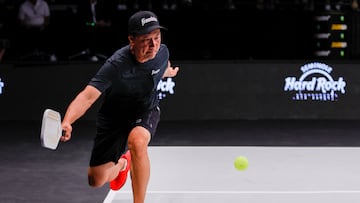How much money do professional pickleball players make?
Contrary to common expectations, pickleball has indeed emerged as a professional sport, and the earnings achieved by certain players are notably substantial.

Pickleball’s rapid growth has indeed created opportunities for players to earn income from the sport. While the top-tier players can potentially earn substantial amounts through a combination of appearance fees, prize money, and sponsorship deals, it’s important to note that the vast majority of pickleball players, even those participating in professional events, earn significantly less and often rely on other sources of income.
“Like anything else, if you’re talented and you work hard, not just at your craft on the pickleball court but also off it, you can make a really nice living,” said Josh Freedman, director of pickleball at Topnotch Management, an agency representing professional pickleball, tennis and soccer players.
“The economics are much, much smaller for others who are just getting into the sport,” he added. “They’re taking sponsorship deals for $500 or $1,000 to be an ambassador of some brand.”
One of the most patient, high-level points I’ve ever seen. 👀
— The Kitchen Pickleball (@TheKitchenPB) August 17, 2023
Tennis players will say it’s boring. Pickleball players will say it’s amazing. ⚖️ pic.twitter.com/4qzEWpomZY
The landscape of professional pickleball earnings can be summarized as follows:
Tournament Prize Money: Players can earn money by performing well in tournaments. The prize money offered in various pickleball tours, such as Major League Pickleball (MLP), Professional Pickleball Association (PPA), and Association of Pickleball Players (APP), can contribute significantly to a player’s earnings. As mentioned, these organizations are projecting substantial growth in prize money distribution over the years.
Appearance Fees and Contract Minimums: Professional players, especially those signed with leagues like MLP, can receive appearance fees or contract minimums. These guarantees ensure that players receive some compensation for participating in events, even if they do not perform well. This provides players with a more stable income, regardless of their performance.
Sponsorship Deals: Sponsorships play a crucial role in a player’s earnings. Top players often secure sponsorship deals with brands and companies related to pickleball, sports, or fitness. These deals can provide additional financial support and exposure.
Secondary Jobs: While the top earners in pickleball may be able to rely solely on their earnings from the sport, many professional players still hold part-time or full-time jobs outside of pickleball. This is particularly true for players who are not consistently at the top of the rankings and are seeking more stability in their income.
Tour Structure and Schedule: Pickleball tournaments are scheduled throughout the year, and players need to carefully plan their participation based on the prize money, appearance fees, and travel costs associated with each event. Some players may choose to focus on certain tours or events that offer better-earning potential.
Potential for Growth: The newness of the professional pickleball landscape suggests that there is potential for increased earnings as the sport gains more attention, fans, investors, and sponsors. As the sport becomes more popular and widely recognized, the financial opportunities for players may expand.
Related stories
“It’s important if you’re going to get into this, it’s really hard, but once you work hard and you get results, it can be a really nice way to live,” Freedman said.
It will be interesting to see how pickleball’s professional scene develops and how it impacts players’ earnings and opportunities as the sport gains further momentum.


